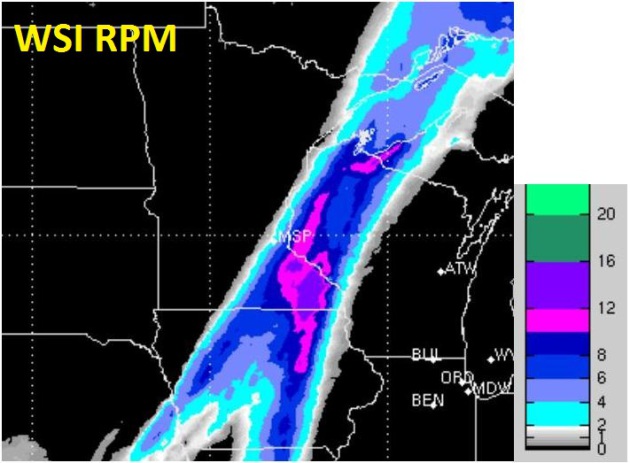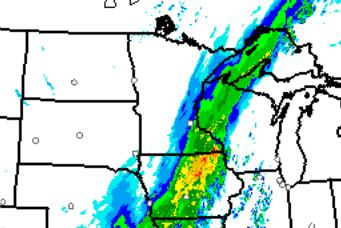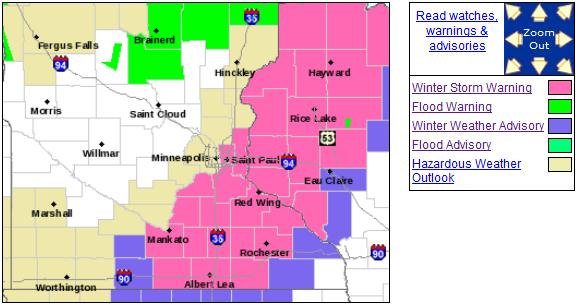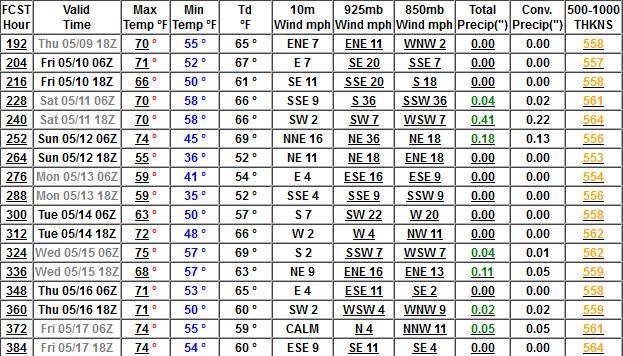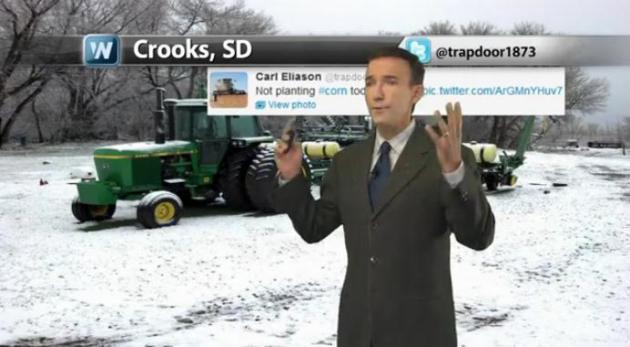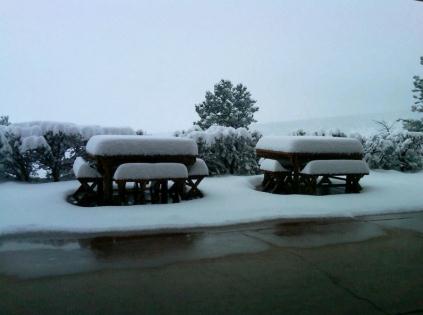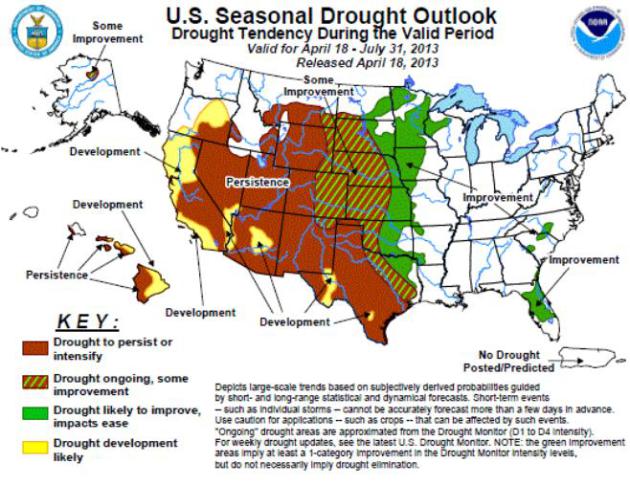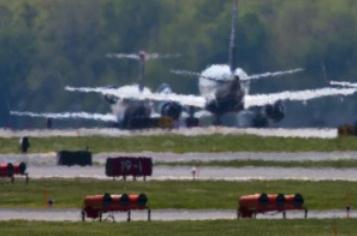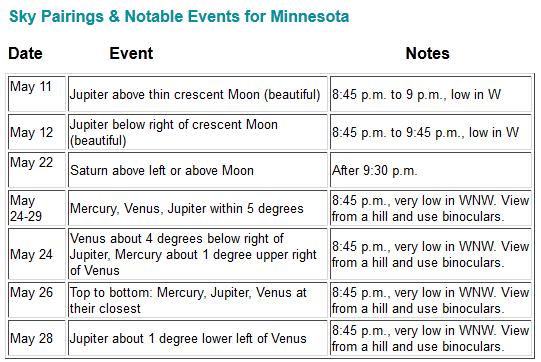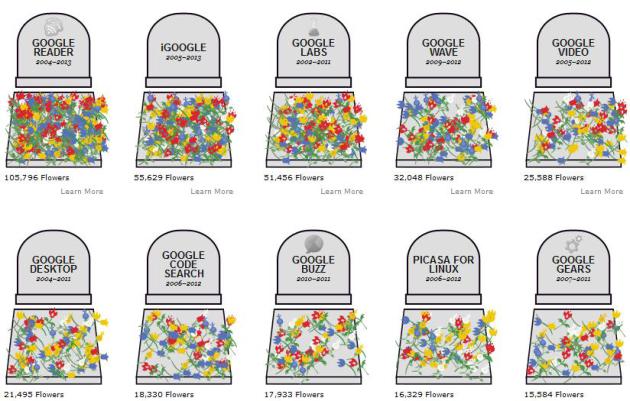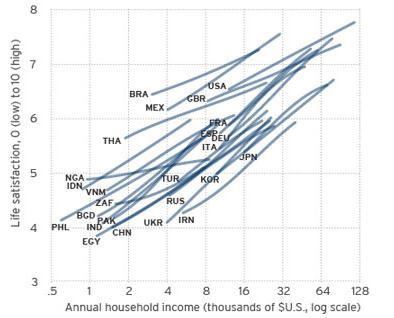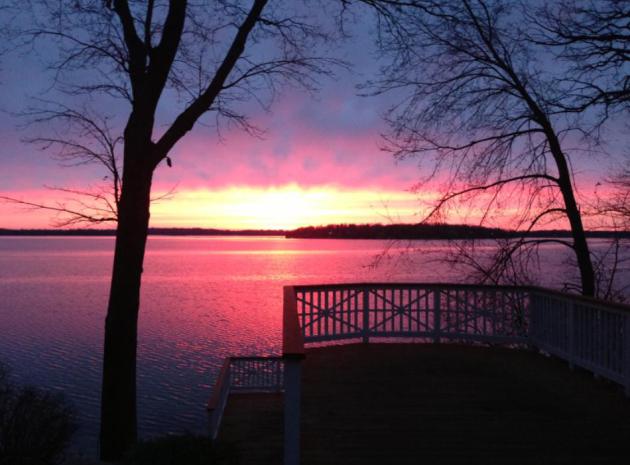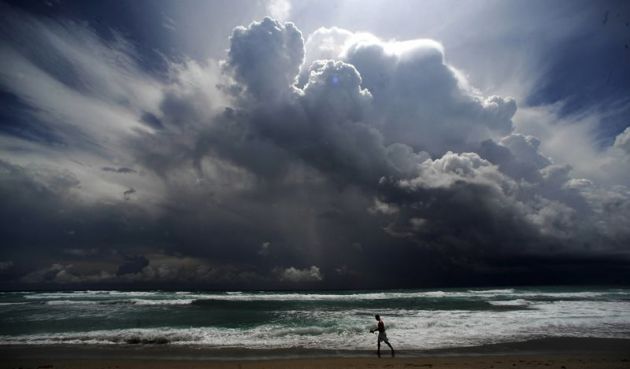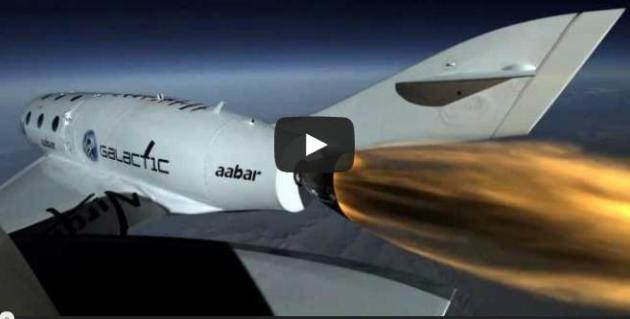July. Only month where snow has never been reported at an official weather station in Minnesota. There's a fun stat.
Brushed By Slush
"May you live in interesting times." Oh yeah.
I've moved my Doppler deep underground, into The Weather Bunker. I'm now
a reluctant new member of the FBI's Witness Protection Program.
Did I mention I'm just the messenger? But if it makes you feel better go ahead and YELL! Get it all out...
This is the price we're paying for a rapid
easing of drought conditions. The same high-amplitude full latitude
trough, a vast kink in the jet stream which behaves like a storm
incubator, is thriving on these huge north-south temperature contrats,
pulling moisture north out of the Gulf of Mexico, turning many Midwest
counties from drought to flood in the meteorological blink of an eye.
Yes, the drought is over for the Twin Cities and
quickly easing everywhere else. There will be water in our lakes,
rivers and topsoil this summer.
But will there be summer? Yes. Abbreviated compared to last year, coming after 7 months in a row of snow.
The all-time May snow record is 3" set in 1946.
If it's going to snow let's set a gasp-worthy record. Concerned loved
ones living in warmer climes may place a "are you OK?" call today.
Perfect.
A slushy, sloppy AM snow (coating to 2" for much
of the metro - considerably more for the southern/eastern suburbs of
St. Paul, where 3-7" may fall) quickly melts; the atmosphere warm enough
for another inch of rain Friday into Saturday. Skies may brighten
Sunday, with highs near 50; better weather for the Lake Minnetonka Half
Marathon. 60s return next week; a cooling trend requiring jackets for
the 2013 Fishing Opener.
Good news: since 1891 MSP hasn't seen snow in June. Ever. Denver's latest snow is June 12.
See, it could be worse.
On Edge. Late night models, including WSI's 12km.
RPM show the heaviest snow bands setting up just south/east of the Twin
Cities, some 10" amounts from near Rochester to Red Wing and Menomonie.
The western suburbs may see a little slush, a better chance of a few
sloppy inches southern and eastern suburbs of St. Paul.
A Close Call. There will be a huge variation in
weather from east to west across the metro area. Heavy rain, mixed with
sleet and some rain east metro, just a coating of slush western suburbs.
HRRR model map valid 7 am courtesy of NOAA.
Winter Storm Warning Shifts East. The northern and
western suburbs are no longer in a warning (or watch); an eastward jog
in the storm track pushing the heaviest band of slush south/east of St.
Paul, where plowable amounts of snow are still expected this morning.
Map: NOAA.
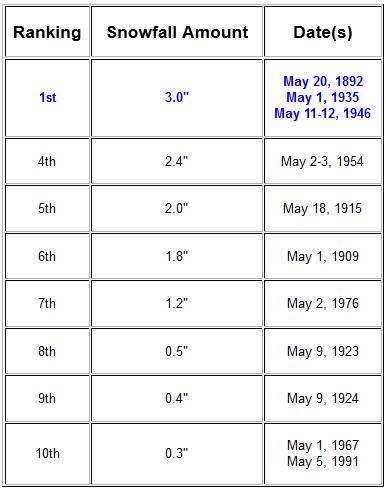 Top 10 May Snow Event?
Top 10 May Snow Event?
For parts of the east metro it may be a Top 5 snowfall, but the
official readings for the Twin Cities are taken at MSP International
Airport. Not sure we'll set an all-time record, but just the fact that I
feel compelled to include this graph speaks volumes. Information
courtesy of the Twin Cities National Weather Service.
So Lousy - It's Almost Funny. Almost. A few weeks
ago I scanned the models with a sense of dread. Now I look at the maps
and just laugh. This is beyond ridiculous. A cut-off low over Missouri
will rotate another surge of moisture and energy into Minnesota Friday,
and the atmosphere may be cold enough for wet snow or even a mix, before
changing to rain by afternoon. Rain spills over into Saturday - skies
brighten Sunday; spring officially returns next week.
Extrended Outlook: More May-like. GFS data shows
highs in the 60s and 70s into mid-May, a chance of showers and T-showers
Fishing Opener Weekend. The ECMWF guidance looks cooler and drier for
the Opener, so I'm not sure I'm buying this just yet.
Forgotten Spring. The cold, stormy (snowy) pattern
gripping the Rockies and Upper Mississippi Valley is impressive; huge
north-south sweeps in the jet stream capable of not only pulling Gulf
moisture north, easing the drought, but also flinging Marchlike
airmasses south of the border, brewing up freakish, late-season
snowstorms. In today's edition of
Climate Matters I take a look at snowfall records for April and why the weather continues to misbehave: "
The
calendar may say May 1st, but the weather maps look much more like
March 1st for the Central Plains and Upper Mississippi Valley. A
freakish snowfall is setting up for portions of Iowa, Minnesota and
Wisconsin. Meteorologist Paul Douglas has more on the May snow as well
as the April snow records."
Winter Is Coming. Texas, Midwest Bracing For Cold.
It's nice that, once again, Minnesota is the brunt of weather-related
jokes and drive-by meteorological gawking. Hey, this IS impressive!
Meteorologist Andrew Freedman at
Climate Central has more details; here's an excerpt: "...
The
cold and snow is the result of a persistent dip in the jet stream
across the Midwest and parts of the West, which has allowed cold,
Canadian air masses to move southward into those regions. The weather
pattern has been largely stuck during the past month, courtesy of a "blocking high"
over Greenland that is acting like a stoplight, preventing storm
systems from progressing from west to east across the country. More than
1,100 snowfall records and 3,400 cold records were set during April,
and May is likely to average out to be cooler than average across the
South Central states, according to the most recent climate outlooks
from the National Oceanic and Atmospheric Administration...."
Photo credit above; "
The snowy scene in Boulder, Colo. on Wednesday morning." Credit: Claudia Tebaldi, Climate Central.
Drought Outlook.
The forecast of an easing drought several months ago is looking pretty
good; a series of wet storms taking big chunks out of the drought, from
east to west across the country. Even the Great Plains are expecting
improving conditions - the worst of the drought shifting into the
Intermountain West and Southwest. Map above showing the forecast from
mid-April thru late-July courtesy of USDA and NOAA.
A Long, Tough Fire Season For The West? Major fires
are already burning near Palm Springs, a bad omen for early May. It was
the 4th driest winter on record for California, another factor to
consider. Drought conditions are expanding westward, setting the stage
for more frequent and potentially devastating wildfires for much of the
southwest, spreading into portions of Oregon, Washington and Idaho by
July and August. Source:
National Interagency Fire Center.
FAA Plan To Terminate Airport Weather Observers Raises Travel Safety Concerns. More potential fall-out from The Sequester. Here's an excerpt of a
Washington Post story from meteorologist Jason Samenow: "
The
responsibility for monitoring the skies at airports across the country
may shift from meteorological professionals to air traffic
controllers, with little weather experience, if a proposal from the
Federal Aviation Administration moves forward. Both the professionals
weather observers, whose jobs are at risk, and aviation groups have
expressed concern that air traffic controllers may not be up to the
task of keeping pilots apprised of rapidly changing weather conditions...."
Photo credit above: "
Heat waves distort a picture of airplanes waiting to take off from National Airport on April 26." (JIM LO SCALZO, EPA)
Hurricane Sandy's Untold Filthy Legacy: Sewage. This takes nasty to a whole new level; some solid reporting from
Climate Central; here's an excerpt: "...
Six
months after Sandy, data from the eight hardest hit states shows that
11 billion gallons of untreated and partially treated sewage flowed
into rivers, bays, canals, and in some cases, city streets, largely as a
result of record storm-surge flooding that swamped the region’s major
sewage treatment facilities. To put that in perspective, 11 billion
gallons is equal to New York’s Central Park stacked 41 feet high with
sewage, or more than 50 times the BP Deepwater Horizon oil spill. The
vast majority of that sewage flowed into the waters of New York City and
northern New Jersey in the days and weeks during and after the
storm. Our analysis of sewage-spill data provided by state agencies and
individual treatment plant operators shows that:
One third of the overflow (3.45 billion gallons) was
essentially untreated raw sewage. The remainder (7.45 billon gallons)
was partially treated, meaning that it received at least some level of
filtration and, perhaps, chlorination..."
Astronomical Events In May. Check out the University of Minnesota
Bell Museum
for more specifics about what's visible in the nighttime sky later this
month. The only white powder I want to see overhead is the Milky Way.
Google Reader Joins Graveyard Of Dead Google Products. Be sure to leave a flower. Details from
Slate: "
It’s
hard to lose a loved one, especially if that loved one is a Google
service. That’s why we’re opening the gates of the Google Graveyard, a
virtual space for grieving. Buried in these hallowed grounds are some
of Google’s ill-fated services. Some, like Google Reader, lived long,
prosperous lives, full of admiration and glory. Most, like Google Wave
and Google Buzz, struggled to carve out a place in this harsh,
unforgiving world where technologies continuously clash and innovation
reigns king. But whether these services transformed our productivity or
only polluted our inboxes, they all touched our world in some way.
Click on a grave to leave a flower, and let the healing process begin."
Emergencies? There's An App For That. We're all
relying less on emergency sirens and more on our smart phones for
time-sensitive, GPS-aware alerts that impact our families. Here's an
excerpt of an interesting article at
Marketplace Tech: "...
The Life360
cellphone app, which has 34 million users, lets you see family
members’ locations and send text messages and emails to them. The basic
app is free, but users can pay for premium service, like 24-hour
personal support. Hulls says the emergency app marketplace has gotten
crowded, as events like Hurricane Sandy and the Sandy Hook school shooting
showed people the need for emergency apps. "It makes so much sense,"
says Hulls. "The fact that we have an always on, Internet and location
enabled device in our pockets, it’s kind of just clicked for
everybody." Everybody from USC to The Red Cross is developing emergency
apps..."
Economists Nail It: You Can Never Be Too Rich. So
this is why we're working so hard. What happened to "the best things in
life are free?" Here's an excerpt from a Peter Coy story at
Bloomberg Businessweek: "
I
just spoke with Justin Wolfers, co-author of a short but important new
paper that concludes the more money you have, on average, the happier
you are. That may seem to deserve a Homer Simpson “Duh!” award for most
obvious research finding of the month, but in fact it contradicts an
assertion made in 1974 by Richard Easterlin, who said that increasing
average income did not increase average well-being. The wife-and-husband
economist team of Betsey Stevenson and Wolfers, who teach at the
University of Michigan, showed
that happiness and life satisfaction are higher in rich countries than
in poor countries. And within any given country, rich people are
happier than poor people..."
How To Be Gracious, And Why. In business it's
usually the little things, but relationships are critical. Face-to-face
interaction, empathizing wih your customer's real needs - remembering
they're buying you as much as your product or service. Here's an excerpt
of a timely article at
Esquire: "...
Remember
that the only representation of you, no matter what your station, is
you — your presentation, your demeanor. You simply must attend. Stand
when someone enters the room, especially if you are lowly and he is the
boss, and even if the reverse is true. Look them in the eye. Ask
yourself: Does anybody need an introduction? If so, before you say one
word about business, introduce them to others with pleasure in your
voice. If you can't muster enthusiasm for the people you happen upon in
life, then you cannot be gracious. Remember, true graciousness demands
that you have time for others..."
Watch: Virgin Galactic's SpaceShip Two Hits Supersonice Speeds During First Rocket-Powered Flight.
This may be the most exciting 16 seconds of your Thursday (looking out
the window doesn't count). Here's an amazing video and except from
The Week: "
Commercial
spaceflight inched one step closer towards reality this week, as
professional billionaire Richard Branson watched his Virgin Galactic
SpaceShipTwo complete its first rocket-powered test flight over
California's Mojave Desert. The flight wasn't very long — just 16
seconds total. According to the Wall Street Journal, once SpaceShipTwo was dropped from its carrier vessel, WhiteKnightTwo, the spaceship climbed through the atmosphere to about 56,000 feet, and reached a velocity 1.2 times the speed of sound:
If future testing goes
well and "if my wife allows," Mr. Branson joked after watching the test
flight, he and his two children plan to be among the first six
voyagers to ride the maiden flight of SpaceShipTwo to the edge of
space. The trip would send passengers about 60 miles above the Earth's
surface, at a maximum speed of about 2,500 miles per hour. [Wall Street Journal]..."
Climate Stories...
Climate Change: When Rain, Rain Won't Go Away. Here's an excerpt of a compelling story and video from
USA Today with a couple of eye-popping statistics: "...
From valleys staggered by Irene, to coasts battered by Superstorm Sandy, the
24-hour outbursts of rain and snow, or "extreme precipitation," has
increased by 74% in the past six decades there, according to January's
draft of the federal National Climate Assessment report. Such
storms have become the signature of climate change across the
Northeast, afflicting older cities and towns built at a time of more
modest rainfall. This heavy flooding is undermining aging bridges,
eroding roads and overwhelming drainage systems..."
Preventing Climate Change Is Good For Business, GM Declares. Here's an excerpt from
The Detroit Free Press: "
General
Motors officially acknowledged today that implementing policies to
prevent climate change is “good business.” GM became the first
automaker to sign the “Climate Declaration” pledge, which is promoted
by nonprofit Ceres’ Business for Innovative Climate & Energy Policy
(BICEP) coalition. The decision to sign the pledge comes as GM has
been pressuring the U.S. government to establish a national energy
policy focused on promoting energy security with a diverse range of
sources, including natural gas and renewables. The automaker sends no
waste to landfills from 105 of plants, and is trying to boost that
figure..."
Photo credit above: "
The LED lights brightens the GM logo
atop the Renaissance Center towers in downtown Detroit on Tuesday,
September 21, 2011. GM plans to install more such lighting on the Ren
Cen." WILLIAM ARCHIE/Detroit Free Press.
* the average U.S vehicle emits 4.8 metric tons of CO2 every year. Source:
EPA.
Climate Change: Where Republicans And Democrats Agree. Here's an excerpt of an Op-Ed at
Science 2.0: "...
Even
on science topics, it isn't always left and right, including on issues
we get told are left and right. Sociologists analyzed some Gallup
survey results - yes, that is what they call a study, in the social
science world - and found common ground among Democrats and Republicans
when it comes to taking action on climate science. People in either
party who accept the consensus on climate change think CO2 emissions are
important enough for the government to curb them, like we have done
with lots of other types of pollution. Now, CO2 in America needs curbed
by the government less and less each day - we have migrated from coal
for energy to natural gas and energy sector CO2 emissions have
plummeted, while the government's $72 billion in green energy
corporation subsidies helped us very little. But it's still good to
know that people will support more government restrictions should they
ever be needed...."

